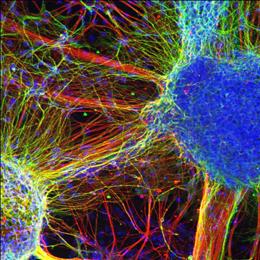Mental illness “in a dish”
Before he committed suicide at age 22, an anonymous man with schizophrenia donated a biopsy of his skin cells to research. Regrown as neurons, the cells may help neuroscientists to decipher the disease with which he struggled from early childhood
Before he committed suicide at age 22, an anonymous man with schizophrenia donated a biopsy of his skin cells to research. Regrown as neurons, the cells may help neuroscientists to decipher the disease with which he struggled from early childhood. These cells are known as induced pluripotent stem (iPS) cells, and they provoke far fewer ethical questions than human embryonic stem cells. Experiments on the cells, as well as those of several other patients, represent the first of what are probably many mental diseases “in a dish”, made by reprogramming patients’ skin cells into an embryonic-like state from which they can be coaxed into any tissue type.
Recreating neuropsychiatric conditions such as schizophrenia and bipolar disorder using such cells presents a big challenge – scientists do not know the underlying biological basis of mental illnesses and symptoms vary between patients. Also, while psychiatric illnesses are strongly impacted by genes, it has proved very difficult to pinpoint many that explain more than a fraction of a person’s risk.
“All of us had been contacted by patients asking ‘when can I get my stem cells to solve my schizophrenia’. It’s not as simple as that,” says Russell Margolis, of Johns Hopkins University in Maryland, who was not involved in the study. “It’s an additional piece to the puzzle as opposed to the answer.” ~ Nature News, Apr 13
Mental illness “in a dish”
Jared Yee
iPS
iPS cells
- Prescribe morning-after pills to young teenagers, say US pediatric group - November 30, 2012
- Bahrain sentences protest docs to prison - November 28, 2012
- Terry Pratchett assisted suicide documentary wins International Emmy - November 27, 2012
